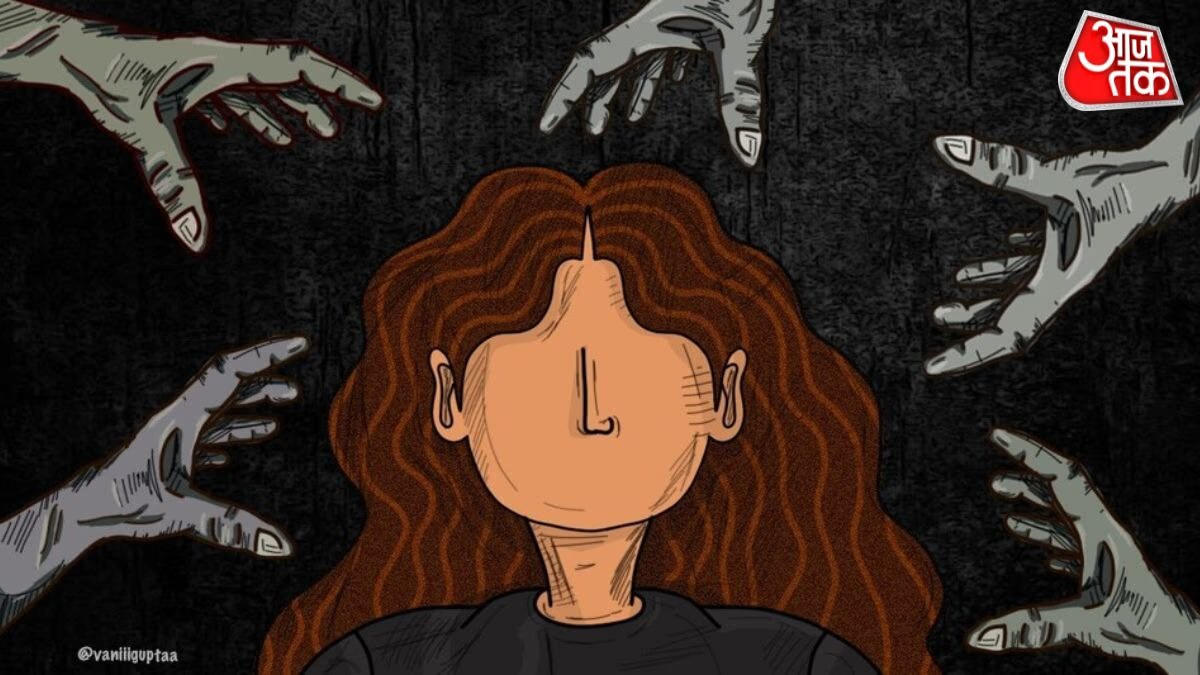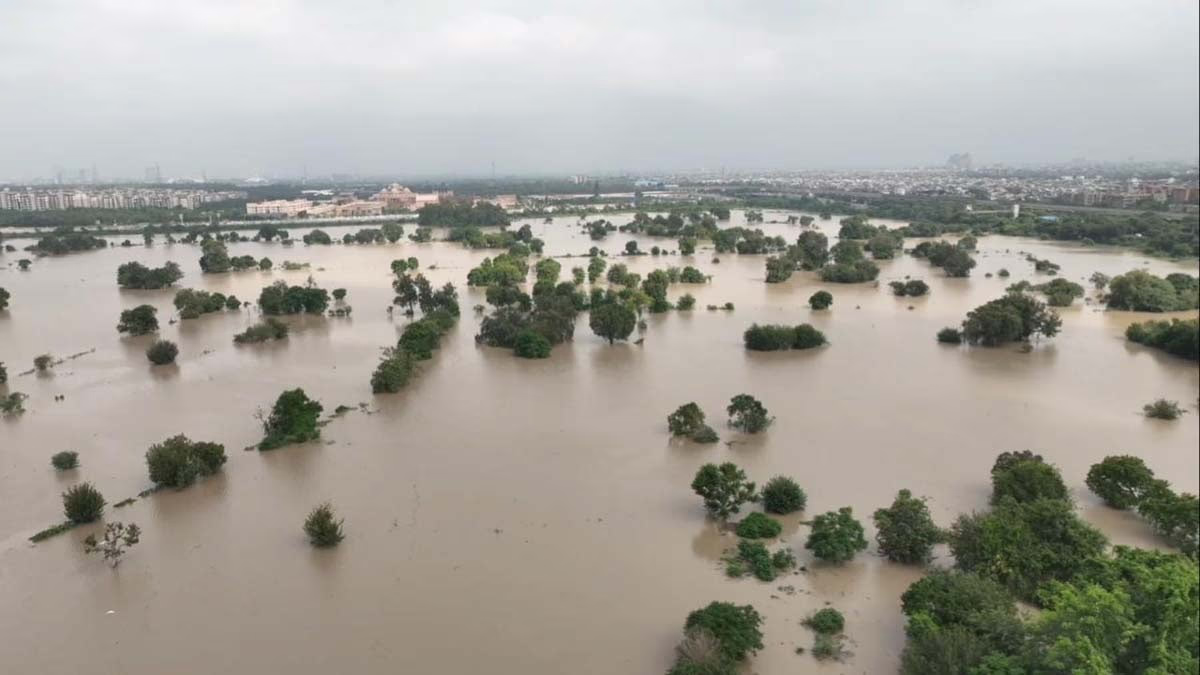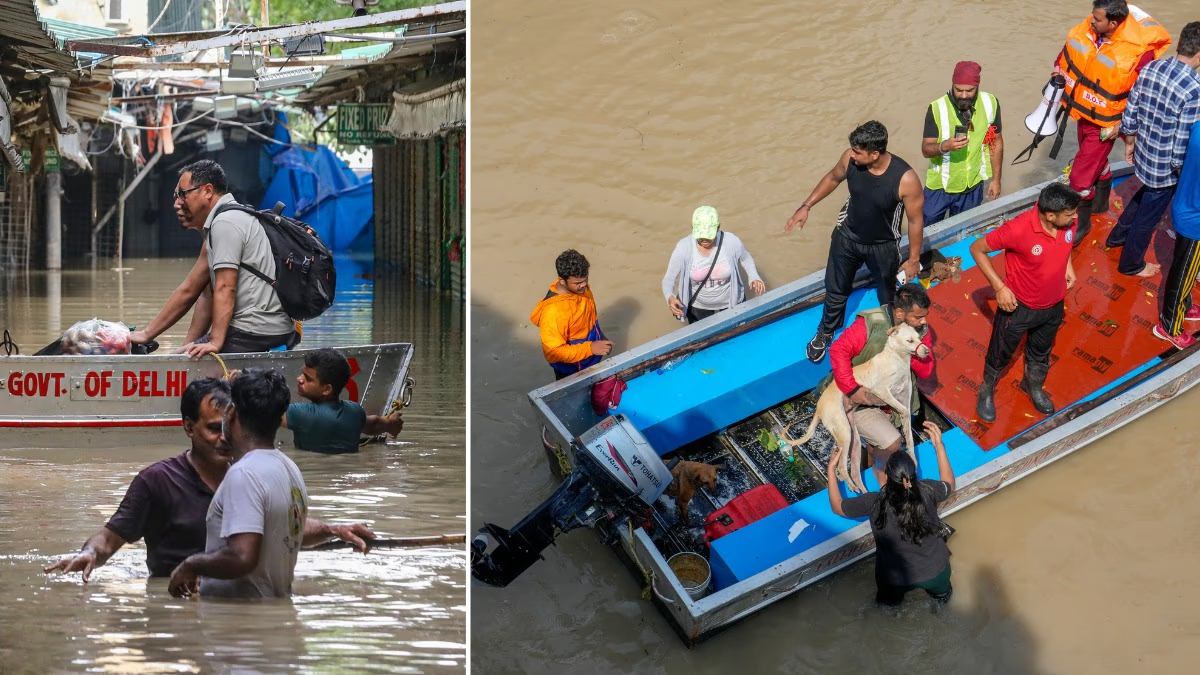- Every hour, three women in India fall victim to rape, which means one woman is raped every 20 minutes. - More than 96% of the accused in rape cases are known to the victims. - Only 27 out of every 100 accused are convicted in rape cases, the rest are acquitted.
These three statistics show that despite stringent laws, there is neither a decline in rape cases in India, nor an increase in conviction rates.
The National Crime Record Bureau (NCRB) data reveals that over four lakh crimes against women are reported every year. These include not only rapes but also molestation, dowry deaths, kidnappings, trafficking, and acid attacks.
The inclusion of crimes against women is crucial because recent rape cases have shaken the nation. The case of the rape and subsequent murder of a resident doctor in Kolkata has echoed the 2012 Nirbhaya case, igniting protests across the country. The accused has been arrested, yet demands for strict punishment persist.
West Bengal Chief Minister Mamata Banerjee has also written to Prime Minister Narendra Modi, urging for stricter punishments in rape cases.
Strict Laws, Unchanged Realities
On the night of December 16, 2012, a young woman was gang-raped on a moving bus in Delhi, crossing all brutal limits. The incident led to her death and shook the entire country.
After the Nirbhaya case, laws were made stricter and the definition of rape was expanded in 2013 to include a wider range of offenses against women. The Juvenile Justice Act was also amended to treat heinous crimes committed by 16 to 18-year-olds as adult crimes, a change prompted by one of the Nirbhaya case convicts being a minor who was released in three years.
Provisions for the death penalty in severe rape cases were also introduced. If a rape victim dies or goes into a coma, the perpetrator can face the death penalty.
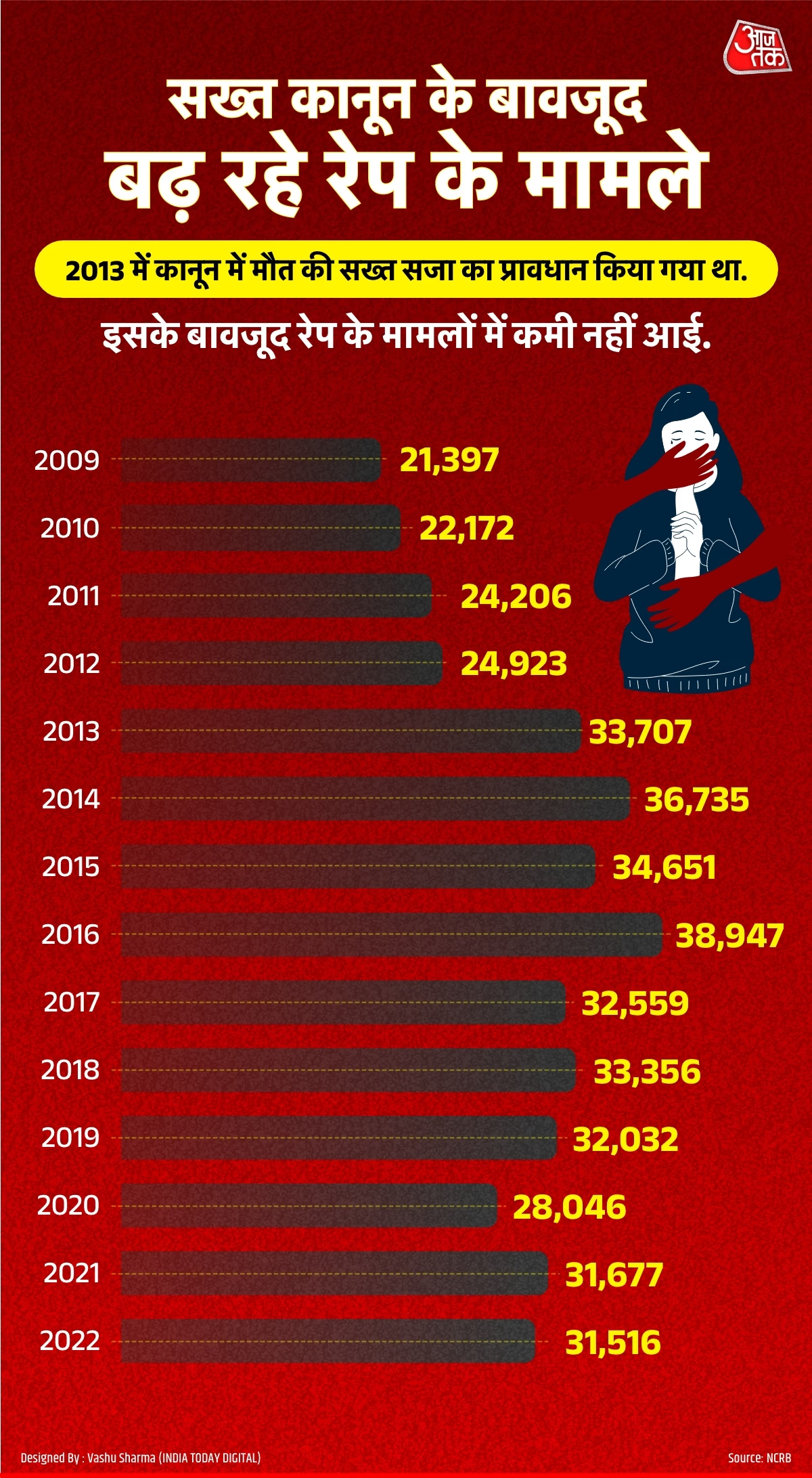
Source: aajtak
Read More:
The Scary Numbers
The figures are intimidating. In 2012, 2.44 lakh cases of crimes against women were reported, rising to over 4.45 lakh in 2022—an average of over 1200 cases every day.
Rape cases have also surged. According to NCRB, 24,923 rape cases were reported in 2012, averaging 68 cases daily. By 2022, this number had escalated to 31,516 with 86 cases reported daily, meaning three women are raped every hour and one every 20 minutes.
State-wise, Rajasthan reported the highest number of rape cases with 5,399 in 2022, followed by Uttar Pradesh with 3,690 cases.
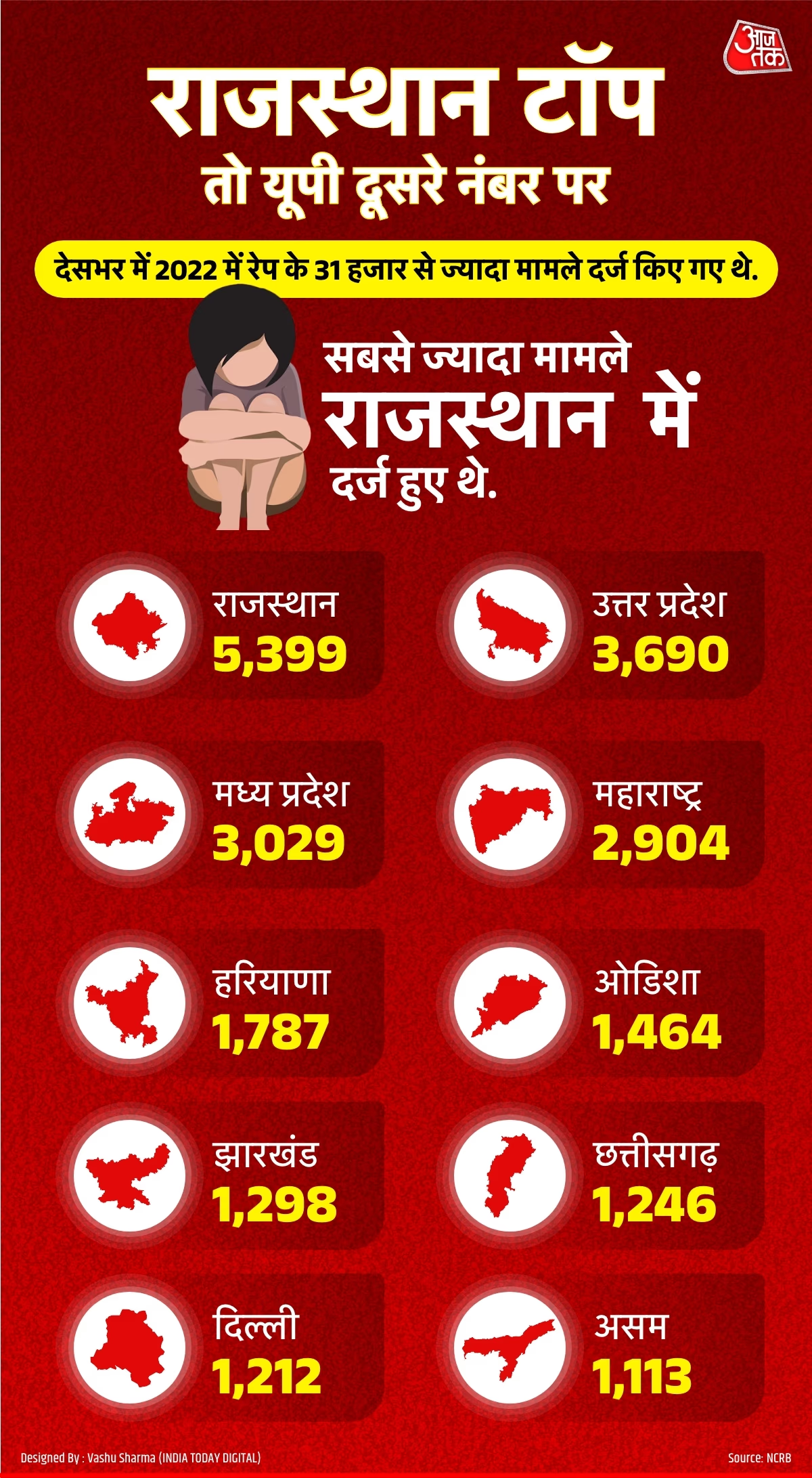
Source: aajtak
In most rape cases, the perpetrator is known to the victim. Statistics show that more than 96% of rape cases involve a known individual.
In 2022, out of 31,516 reported rape cases, 30,514 involved a known individual, where 2,324 were family members, 14,582 were online friends, live-in partners, or individuals who promised marriage, and 13,548 were family friends, neighbors, or acquaintances.
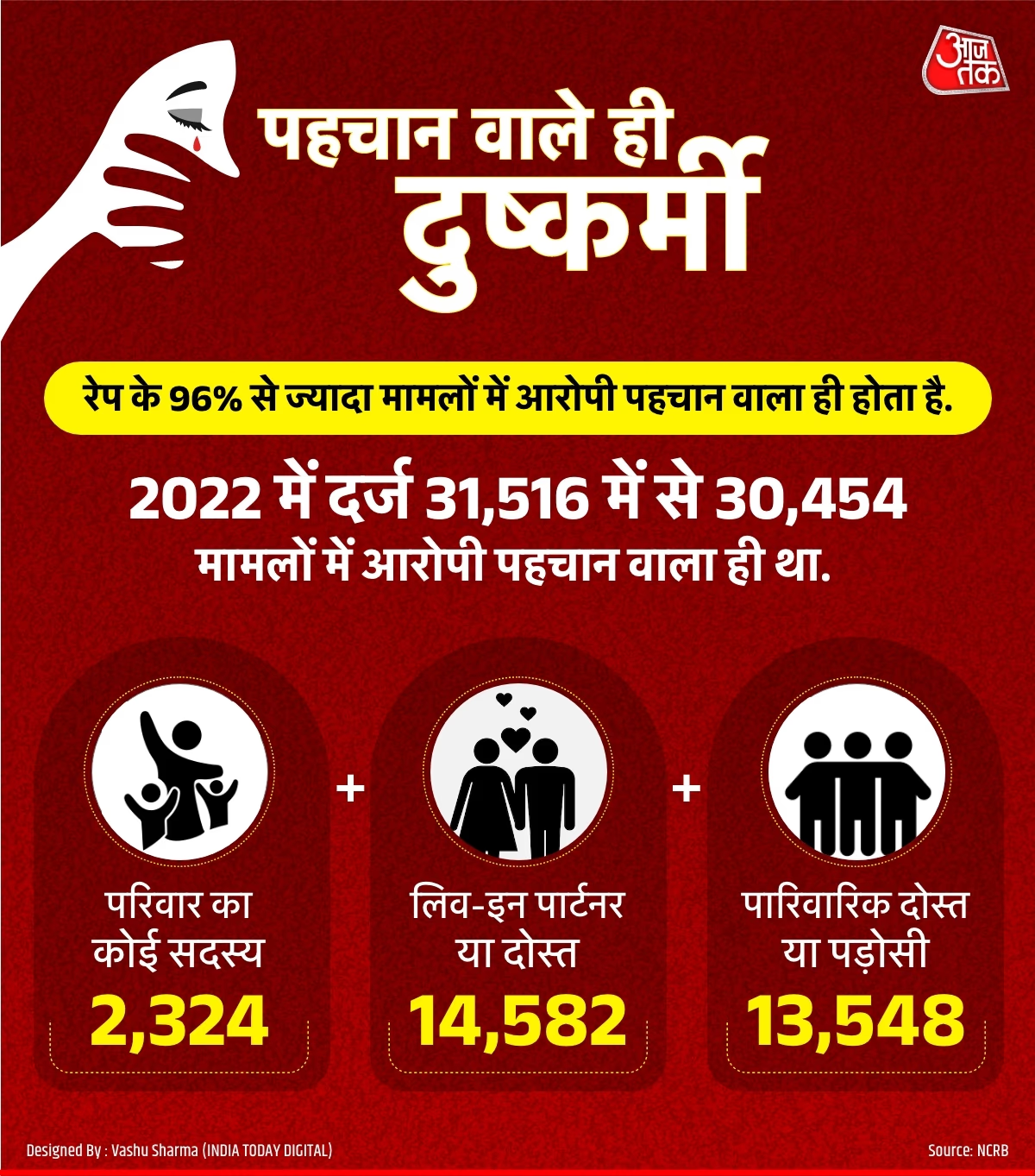
Source: aajtak
Read More:
How Many Cases Result in Conviction?
NCRB data shows that the conviction rate in rape cases is 27-28%, meaning only 27 out of 100 accused are found guilty, and the rest are acquitted.
The report reveals that as of 2022, nearly two lakh rape cases were pending in Indian courts, with only 18,500 cases going to trial that year. Of these, about 5,000 resulted in convictions, while over 12,000 led to acquittals.
Outside India, the UK's conviction rate for rape cases exceeds 60%, and in Canada, it is over 40%.
Lawyer Rebecca M. John told Reuters that Indian judges are reluctant to convict rape accused. They tend to acquit them due to a lack of evidence, while they should at least hand down some punishment to establish guilt.
Despite the provision for the death penalty, only five rapists have been executed in 24 years. Dhananjay Chatterjee was hanged in 2004 for a 1990 rape case, and in March 2020, the Nirbhaya case convicts—Mukesh, Vinay, Pawan, and Akshay—were executed in Tihar Jail.
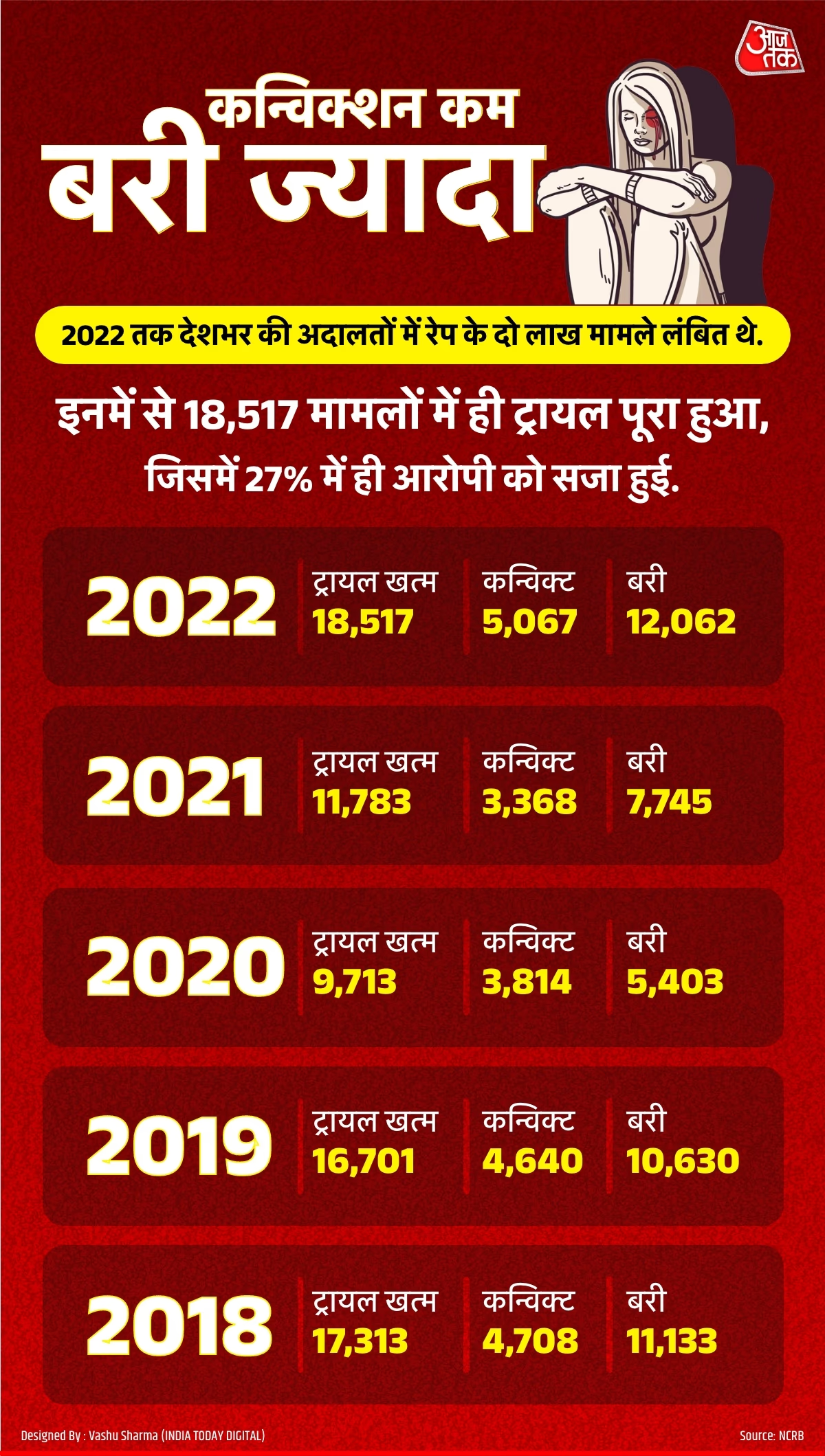
Source: aajtak
What Does The Law Say About Crimes Against Women?
New criminal laws were introduced two months ago, replacing the IPC with the Indian Penal Code (BNS).
The IPC's Section 375 defines rape, and Section 376 outlines its punishment. In the BNS, Section 63 defines rape, and Sections 64 to 70 stipulate penalties. Section 376 of the IPC includes a provision for up to 10 years of imprisonment for rape, and BNS's Section 64 carries the same penalty.
BNS has introduced stricter punishments for crimes against minors. For raping a girl under 16, a minimum of 20 years in jail, extendable to life imprisonment, is mandated. Life sentences imply the convict will spend the rest of their life in jail.
Under BNS's Section 65, raping a girl under 12 can result in 20 years to life imprisonment or even the death penalty. A fine is also imposed.
For gang rapes under Section 70(2), a minimum of life imprisonment and the death penalty is mandated, with fines also applicable. The IPC only prescribed the death penalty for gang rapes of girls under 12.
Under BNS's Section 66, if a rape victim dies or falls into a coma, the convict faces a minimum of 20 years in jail, which can be extended to life imprisonment or the death penalty.
A new Section 69 is added in BNS. It prescribes up to 10 years of imprisonment and fines for having sexual relations under false promises of marriage, employment, or promotion. Concealing identity for marriage also attracts a 10-year sentence.
Read More: The Law that Offers Alimony to Divorced Muslim Women
POCSO Act for Minors
The POCSO Act, introduced after the 2012 Nirbhaya case, safeguards minors from sexual offenses. The Act considers individuals under 18 as children and imposes stringent penalties for crimes against them.
Before the 2019 amendment, the POCSO Act did not carry the death penalty. Now, offenders sentenced to life imprisonment will spend their entire lives in jail.
According to NCRB, around 54,000 cases under the POCSO Act were registered in 2021, up from 47,000 in 2020. Between 2017 and 2021, over 2.20 lakh cases were recorded.
However, the POCSO Act has a low conviction rate. Data indicates that out of 61,117 trials completed over five years, only 21,070 (about 35%) resulted in convictions, with 37,383 acquittals.
